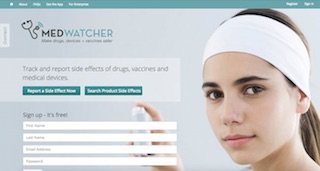 John Brownstein's Computational Epidemiology Group at Boston Children’s Hospital has received attention in the past for its efforts to use data streams from social media, along with publicly available data from the government, to predict outbreaks of disease. Under Brownstein's directorship, the team has mined Yelp for the foods most likely to cause food poisoning, helped aggregate data about the Ebola outbreak in West Africa, and used Twitter to explore the causes of insomnia.
John Brownstein's Computational Epidemiology Group at Boston Children’s Hospital has received attention in the past for its efforts to use data streams from social media, along with publicly available data from the government, to predict outbreaks of disease. Under Brownstein's directorship, the team has mined Yelp for the foods most likely to cause food poisoning, helped aggregate data about the Ebola outbreak in West Africa, and used Twitter to explore the causes of insomnia.
A few years ago, the team spun off and established itself as a new company, called Epidemico, which held the commercial license for HealthMap. It was acquired last year as a fully owned subsidiary of Booz Allen Hamilton.
At HxRefactored 2015, a healthcare design conference held this week in Boston, Brownstein compared public health data to data about the weather, which is always at consumers' fingertips when they need to plan their day.
"When it comes to the idea of population health, we’re missing some of those tools," he said. "We’re missing the data, we’re missing the realtime information, we’re missing the forecasting methods. And we’re missing the consumer tools that feed back to the patient to inform us about what’s happening around us."
Epidemico is interested in turning that data around and making it available and helpful to the public. At the conference, Brownstein described five other crowdsourced data projects his team has been working on.
Flu Near You -- With the app and web platform Flu Near You, HealthMap, Boston Children's Hospital, and the Skoll Global Threats Fund created a platform where people can check in weekly about their health status. That data is aggregated to create a realtime map of the flu. It has some benefits over the CDC's flu data as it doesn't miss people who don't go to the hospital and it can return data with a shorter lag time.
Thermia -- Thermia is a decision support tool for parents worried about their children's fever. It combines protocols that were already on the books at Boston Children's Hospital with a web platform, so parents can enter information about the extent and duration of their child's fever, and the tool will tell them whether they should be bringing the child into the hospital. It can also combine with temperature monitoring tools like Raiing's iThermonitor, so that when the device detects a certain temperature, an app automatically gives the parent the appropriate recommendation from the hospital's protocols.
MedWatcher Social -- Building on research from last year, Epidemico partnered with the FDA to comb Twitter for tweets about drug side effects and turn those tweets into data that's more complete than the FDA's traditional adverse reaction database. Bronwstein said that out of 20.5 million drug mentions on Twitter, only about 324,000 were actually adverse event reports, so the project requires a ton of creative data filtering. Once tweets are identified as being adverse events reports, MedWatcher tweets back at them and prompts them to fill out a more complete report.
StreetRx -- Probably the most surprising product Brownstein discussed was StreetRx, which crowdsources the black market for prices of prescription drugs. People can log in and anonymously tell the tool where they purchased a prescription drug and how much they paid for it. The platform also monitors the surprisingly prolific Instagram and Twitter posts about people buying and selling illegal drugs. The idea is to be able to keep tabs on street values, in order to assess whether efforts to drive those prices down are successful. For instance, the formulation of Oxycontin was recently changed so people can't get high off crushing and snorting it, Brownstein said. StreetRx allowed the company to confirm that strategy was working.
HealthMap Vaccine Finder & UberHealth -- HealthMap also offers a tool for finding providers of vaccines, including the flu shot. Last year, they partnered with Uber to offer mobile flu shots that could be ordered via Uber. Brownstein thinks this is an area ripe for innovation, especially since it brought in so many people who had previously never gotten a flu shot before.
"We got many, many people that have never gotten a flu shot in their lives," he said. "I think there’s a huge opportunity in connecting mobile delivery in healthcare with some of the work we’ve been doing longterm."
















